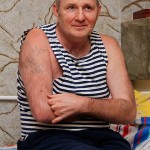
Crusading Russian journalist dies five years after severe beating left him totally disabled.
from Radio Free Europe
Crusading Russian journalist Mikhail Beketov died on April 8, five years after being savagely beaten in his hometown of Khimki near Moscow. Beketov, who was left severely brain damaged from the attack, had uncovered alleged large-scale corruption surrounding the construction of a controversial Moscow-St. Petersburg highway through the Khimki Forest.
RFE/RL’s Claire Bigg spoke to prominent opposition campaigner Yevgenia Chirikova, the leader of the Defenders of Khimki Forest movement and a close friend of Beketov.
RFE/RL:
You first met Mikhail Beketov through your efforts to save the Khimki Forest. What kind of person was he before the attack?
Yevgenia Chirikova:
He lived for his newspaper, Khimkinskaya pravda. He published it single-handedly. He wrote articles and published it in 15,000 copies, which is a huge circulation for our town. It was a backbreaking task that he carried out without reward. His work was very important for us. The journalist Mikhail Beketov was the first person to interview me.
The worst moment in my life was seeing Misha after intensive care. He was half his size. He had lost 50 kilograms. He had a leg and four fingers amputated, and he was half-paralyzed. He never learned to speak again.
He was very gifted and fiery. I still see him before me, Misha, this handsome 2-meter giant who would come in running with a pile of newspapers. He was always busy. He would quickly run out after setting up yet another meeting, always lashing out at the administration and rejoicing if there was positive news. He was a very bright and good person, and we miss him terribly.
RFE/RL:
The attack left him disabled and severely brain-damaged. Were you able to communicate with him despite his disabilities?
Chirikova:
The worst moment in my life was seeing Misha after intensive care. He was half his size. He had lost 50 kilograms. He had a leg and four fingers amputated, and he was half-paralyzed. He never learned to speak again. The hand that still had fingers was paralyzed, so he could not write. It is a huge tragedy.
And the most tragic is that he knew an attack was being prepared against him. He said that if anything ever happened to him we had to look at the Khimki city administration.
It is better when a large number of people deal with problems in the city so that authorities understand that if they kill one person there are still 120,000 others left that cannot all be killed.
I remember very vividly one of our last encounters. I went to visit him. It was impossible to talk with him, he was like a small child. He smiled and nodded, but it was difficult to know whether he understood you. His eyes, however, were very expressive, and I had the impression that he understood. We decided to entertain him, and friends suggested that I sing him a song. I sang him a Russian folk song. He listened so attentively, he enjoyed it so much! It was a bright episode in our relationship.
RFE/RL:
The assault on Beketov sparked widespread outrage in Russia. What lessons do you think should be drawn from his terrible fate?
Chirikova:
Above all, that when you are fighting, there must be many people around who support you. You need a big pool of like-minded people. Misha was alone, and he was therefore very exposed. It is better when a large number of people deal with problems in the city so that authorities understand that if they kill one person there are still 120,000 others left that cannot all be killed. People must simply be more active.
Copyright (c) 2013. RFE/RL, Inc. Reprinted with the permission of Radio Free Europe/Radio Liberty, 1201 Connecticut Ave., N.W. Washington DC 20036.
© Copyright 2013 Radio Free Europe/ Radio Liberty, All rights Reserved. Written For: StraightGoods.ca2 Responses to “The death of a whistleblowing journalist”
Sorry, the comment form is closed at this time.


Even in western countries bearer of freedom & of press cannot say anything against Holocaust nor of Israeli genoide & atrocities in Palestine or USA invasions as USA targetted AlJazera report & killed him in Iraq & repleced its CEO thru Bahrain King. So why is such a big news or west is complaining?
Even in western countries bearer of freedom & of press cannot say anything against Holocaust nor of Israeli genocide & atrocities in Palestine or USA invasions as USA targetted AlJazera reporter & killed him in Iraq & repleced its CEO thru Bahrain King. So why is such a big news or issue or what is west complaining about & why the hypocritical double standard?